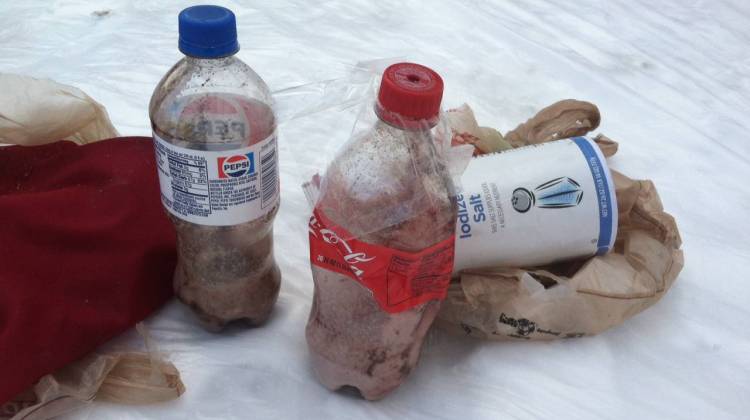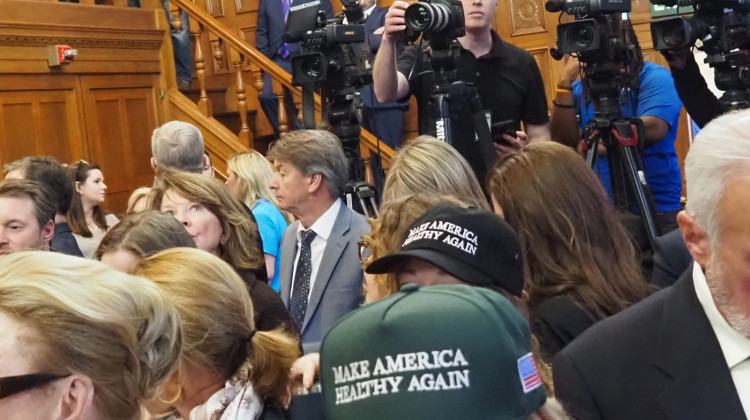INDIANAPOLIS – Bills aiming to reduce Indiana’s meth problem by requiring prescriptions for some cold medicines probably won’t be considered in House or Senate committees this session, key lawmakers said.
House Public Health Chairman Ed Clere, R-New Albany, said he doesn’t want to make it harder for Hoosiers to get the over-the-counter medicines they need, even if they contain pseudoephedrine, an ingredient in meth.
And Senate Corrections and Criminal Law Chairman Mike Young, R-Indianapolis, said he plans to have a hearing on a meth-related bill he has authored instead of those requiring prescriptions for cold medicines.
Young’s legislation – Senate Bill 536 – is meant to prevent the sale of pseudoephedrine-based products to anyone who’s been convicted of meth-related crimes. It would require the courts to report all such convictions so the names can be put into the state’s National Precursor Log Exchange, a database used to track pseudoephedrine purchases and prevent people from buying more than allowed by law.
Young said that will be more effective than targeting everyone who wants to buy the medicines.
“It’s better to prevent individuals with methamphetamine related convictions from purchasing ephedrine and pseudoephedrine,” Young said.
But some say Indiana should move to a prescription-based system and several bills filed this year would make that happen.
Senate Bill 290, authored by Sen. Susan Glick, R- LaGrange, will make anything containing ephedrine or pseudoephedrine a schedule III controlled substance, which requires a prescription.
Senate Bill 445, authored by Sen. Brent Steele, R- Bedford, would do the same, except pseudoephedrine would be made a schedule IV controlled substance instead.
House Bill 1390, authored by Rep. Wendy McNamara, R- Mount Vernon, proposes to reduce the amount of drugs containing ephedrine or pseudoephedrine that a customer can buy. Currently in Indiana, 7.2 grams of medication containing pseudoephedrine can be purchased during a one-month period, and 61.2 grams can be bought in a year.
Rep. Ben Smaltz, R-Auburn, the co-author of HB 1390, wants to drop the annual limit to 9.6 grams per year. Beyond that, a customer could obtain more only with a prescription or other order from a doctor.
The larger goal of each meth-related bill is the same – reduce the amount of meth being manufactured in Indiana.
In 2013, Indiana had 1,808 meth lab busts, more than any other state.
But while Indiana’s numbers remain high, other states, including Tennessee and Missouri, are experiencing huge reductions in the number of meth lab busts. For over a decade Missouri led the nation in meth lab busts, but dropped down below Indiana and Tennessee in 2013.
However, data submitted by the Indiana State Police showed a decrease in meth lab busts last year. A total of 1,488 meth labs were reportedly busted in 2014.
Some say the reduction in the number of labs is in part because the nation has been flooded with meth from Mexico, reducing the need for criminals to cook their own. The Mexican meth has been reported to be almost 100 percent in purity and cheaper than U.S. made meth.
It also uses the organic compound phenylacetone, a substance that has been banned in the U.S. but not in Mexico. This compound takes the place of the pseudoephedrine used in the U.S. to make the drug.
First Sergeant Niki Crawford, who commands the Indiana State Police Meth Suppression Unit, said that the agency has not taken a stand on any of the bills. But Crawford said she believes that having more control over pseudoephedrine would help the state get a handle on the meth labs.
“All precursor methods to creating meth are controlled by the DEA except pseudoephedrine,” Crawford said.
Crawford said she disagrees that Mexican meth is purer than what is made in the U.S. She also said the Mexican meth comes from a different quality of manufacturing and her information showed that the meth coming in from Mexico is not as strong as what is made here.
“There are different people making it and most do it based on how they were taught,” Crawford said. “So that makes it either strong or not as strong.”
Glick said she is not locked in on her proposal.
“If my bill is too strong that’s fine,” Glick said. “Just as long as we pass one of them.”
But she noted that in the three states that have made pseudoephedrine available only by prescription, meth lab busts are down – a statistic some critics refute. And Crawford and Glick said that’s the larger goal.
“Labs affect more than just those using,” Crawford said. “There are children and pets living in these conditions. They also don’t have protective gear that we use so explosions and fires are a big risk. We don’t have those kinds of problems with imported cartel meth.”
Reports from the state police show that a total of 362 children were affected by meth labs in 2014 alone. That was also a slight decrease from the 440 children affected in 2013.
But despite the problems with meth labs, Clere said he remains sensitive to the concerns of constituents about the bills that require prescriptions.
“The legislation is well intended but I’m not certain that it would solve the problem,” Clere said. “I am certain it would create hardships and make things difficult for people trying to buy a proven and inexpensive medication. Unfortunately criminals are always going to look for other ways.”
Ben Brown is a reporter for TheStatehouseFile.com, a news website powered by Franklin College journalism students.
 DONATE
DONATE







 Support WFYI. We can't do it without you.
Support WFYI. We can't do it without you.